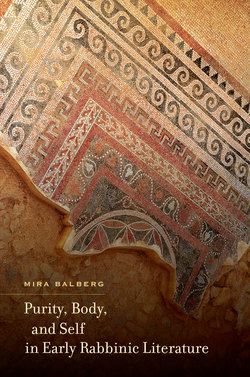Purity, Body, and Self in Early Rabbinic Literature

Реклама. ООО «ЛитРес», ИНН: 7719571260.
Оглавление
DR. S Mira Balberg. Purity, Body, and Self in Early Rabbinic Literature
Отрывок из книги
THE S. MARK TAPER FOUNDATION
IMPRINT IN JEWISH STUDIES
.....
(iii) Inanimate objects and corpse impurity. According to biblical law, every object or person that touches a corpse or shares a space with one becomes impure for seven days and can convey impurity further to whatever touches this object or person, which will in turn be impure for one day. For example, if a corpse is placed on a bed, the bed on which it lies will be impure for seven days, and if Jill then touches this bed, Jill will be impure for one day. The rabbis, however, rule that inanimate objects that touch a corpse become like the corpse itself, and whatever touches them will become impure for seven days and make whatever touches this object or person impure for one day.68 In the rabbinic scheme, then, the bed on which the corpse lies becomes like the corpse itself: if Jill touches the bed, she will become impure for seven days, and if Jill touches jack, he will become impure for one day (whereas in the biblical scheme Jack would not be affected at all). Furthermore, the rabbis rule that if an inanimate object touches something that has had contact with a corpse—that is, something which is impure for seven days—the inanimate object itself becomes impure for seven days, making whatever touches it impure for one day. To return to our example, if Jill touched the bed on which a corpse was placed, Jill becomes impure for seven days; if Jill then touches a cup, the cup becomes impure for seven days, like Jill; and if Jack then touches the cup, he becomes impure for one day. This means that even something or someone three times removed from a corpse can contract the same degree of impurity as something or someone that touched it directly.69
These three principles of duplication of impurity, whether they originated in the rabbinic system or were inherited from earlier interpretive traditions, amount to a significant expansion of the realm and repercussions of impurity. If impurity can be contracted not only directly from the source but also, in certain settings, from something that had contact with the source, then the presence of impurity in the world becomes much more pervasive and, at the same time, can much more easily escape one’s consciousness: while one is likely to know if one touched an impure person, one is much less likely to know if one touched something that was touched by an impure person. This pervasiveness of impurity and its enhanced transferability in the mishnaic impurity system thus lead to a new perspective on impurity, at the center of which stand not the primary sources of impurity, but those who are likely to contract it.
.....